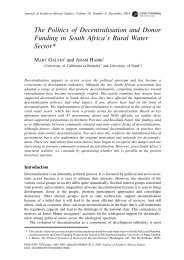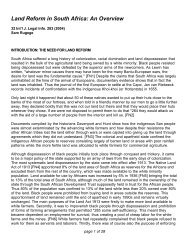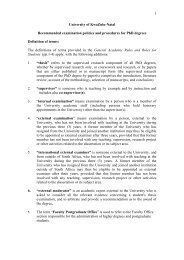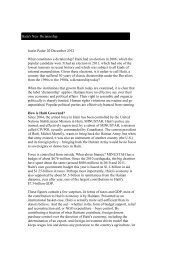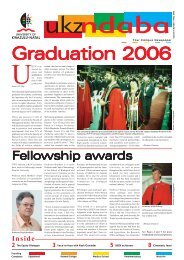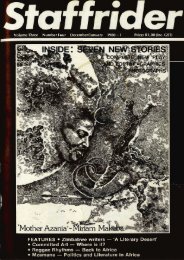Staffrider Vol.6 No.2 1985 - DISA
Staffrider Vol.6 No.2 1985 - DISA
Staffrider Vol.6 No.2 1985 - DISA
You also want an ePaper? Increase the reach of your titles
YUMPU automatically turns print PDFs into web optimized ePapers that Google loves.
Staf frider Popular HistoryMhala, the great chief of the Ndlambewhose lands stretched from the Komgato present-day Berlin, was accused withhis councillor, Kente, of raising waragainst the Queen. He was sentenced tolife imprisonment, but the injustice ofhis trial was so obvious that this wasreduced to five years.Maqoma, the greatest military mindamong the Xhosa, was charged withsending his men to kill a police informer,and sentenced to twenty years. Hisbrother, Xhoxho, convicted of stocktheft, broke out of King Williams Townjail but was recaptured when he foolishlyvisited his old homestead. He wasimprisoned on the Island with anincreased sentence.The Gquhukhwebe chief Phatho,who fought on the Colonial side in theWar of Mlanjeni, learned his mistakethe hard way. Together with his sons,Dilima, Mate and Mpafa, and hisbrother-in-law, the chief Stokwe, he wasconvicted for stock theft and transportedto Robben Island.Fadana, a former ruler of theThembu kingdom, was the leader of theNongqawuse believers in the Queenstowndistrict. He remained defiant,despite the failure of his hopes, andraised an army of 500 starving believersto plunder the opponents of Nongqawuseof the cattle they had saved for themselves.Fadana was captured togetherwith chief Qwesha of the amaNdungwanaand sent to Robben Island for sevenyears.Robben IslandRobben Island was known to Europeansailors for its valuable seal skins (rob isDutch for seal) long before the arrivalof Jan van Riebeeck in 1652. When,resisting the occupation of their land,the Khoi raided the Dutch herds, VanRiebeeck fed his soldiers on penguinmeat and penguin eggs from the Island.The first Colonial officials were sent tothe Island to breed sheep and rockrabbits(dassies) for meat. In 1658,South Africa's first political prisoners —Khoi leaders known to us only as Harry,Boubo and Jan Cou — were transportedto Robben Island.lundreds of physicallyand mentally crippled peoplewere housed m the oldcells and jails and themale lunatics were set towork in the stonequarries.The Island was valued as a prison notonly because the prisoners found itdifficult to escape, but because itconcealed the terrible conditions underwhich the convicts lived, and the dreadfulpunishments they suffered. Convictedprisoners were often sentenced towhippings with the cat-o-nine-tails, tobranding and pinching with red-hotirons and to the chopping off of theirhands. Hard labour could mean up totwenty-five years quarrying stone andburning lime, working and sleepingall the while in irons and chains.The British conquest of the Cape(1806) eased most of these cruelpunishments, but it did not change theessential function of Robben Island asa remote place where those who defiedthe Colonial system could be dumped,punished and forgotten. It was only inthe 1840s, when an energetic officialnamed John Montagu became ColonialSecretary, that the situation was altered.Montagu saw that hard labour convictscould serve the Colonial economy moreefficiently by building roads, harboursand transport infrastructure than bytoiling away unproductively on theIsland. Thus in 1844, the regular convictsleft the Island for hard labour at 'convictstations' throughout the Colony.Lepers and LunaticsAt this time, lepers, lunatics, thedestitute and the chronic sick werehoused in public institutions at 'a veryheavy annual expense' in Montagu'sview. Moreover, the appalling state ofthese places bore embarrassing witnessto the heartlessness of the selfish andacquisitive Cape society. Hundreds ofphysically and mentally crippled peoplewere housed in the old cells and jails,and the male lunatics were set to workin the stone quarries — because hardwork was thought to keep them quiet.Little attempt was made to rehabilitatethese social discards. Lepers (a categorywhich included syphilitics and skincancer victims) and lunatics mingledwith each other, the peaceful with theviolent and the hopeful with thehopeless. They rarely saw friends orfamily, and they had very little chanceof ever getting out again. When theXhosa chiefs arrived in 1858, RobbenIsland was little better than a junkyardfor the Colony's unwanted humanrejects.I t was at Murray's Bay,described as "one ofthe bleakest and mostwretched spots on the faceof the earth," that the Xhosachiefs were settled.In TransitWhen the soldiers brought the Xhosachief Mhala down to East London,harbour, they put him under a craneand pretended that they were going tohang him. They even put a rope aroundhis neck. Mhala remained calm anddignified throughout this ordeal, but assoon as he was put on board ship, he letout three loud and piercing yells. Hehad never been so close to the seabefore, and thought that the waveswhich dashed against the tiny sailingshipwere coming to get him. Anobserver reported that Mhala was verydejected as the ship sailed away, andthat he 'sat on deck looking wistfully atthe land that was once his own.'We do not know whether the otherXhosa suffered similar experiences.Certainly, they travelled in chains.Fadana's irons were so heavy that theyrubbed his skin right through. Maqoma'schains were 'heavy enough for a ship'scable' but he did not notice them. Hewas expecting to see Sir George Grey,hoping not only that the governor30 STAFFRIDER, VOL. 6 NO. 2, <strong>1985</strong>




